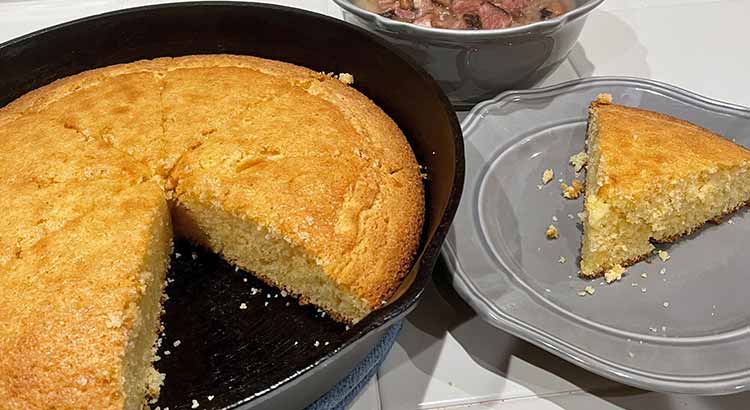Ever tried baking cornbread without baking powder? Wonder no more!
Yes, you can make cornbread without baking powder! When your kitchen’s out of this rising agent, don’t fret. Several alternatives like buttermilk, yogurt, and even vinegar and baking soda can work their magic.
Discover these fantastic alternatives to create delicious cornbread that rises to the occasion. Whether you’re out of baking powder or just curious, we’ve got you covered. Say goodbye to flat cornbread and hello to flavorful, fluffy bites. Let’s dive into these creative solutions and whip up a batch of scrumptious cornbread that’ll leave you craving more.
Buttermilk
If you’re out of baking powder and need to whip up some cornbread, buttermilk can come to the rescue. This tangy liquid not only adds a unique flavor to your cornbread but also acts as a substitute for baking powder. The acidity in buttermilk reacts with other ingredients, creating the lift needed for your cornbread to rise.
To use buttermilk as a baking powder alternative, replace each teaspoon of baking powder with 1/2 cup of buttermilk. Additionally, reduce the liquid in your recipe by 1/2 cup to maintain the right consistency. The result? Moist, fluffy cornbread that’s ready to delight your taste buds.
Yogurt
Yogurt isn’t just a breakfast staple – it can be a game-changer in your cornbread recipe too. Its natural acidity and creaminess can mimic the effects of baking powder, helping your cornbread rise beautifully. To make the switch, substitute 1 teaspoon of baking powder with 1/4 cup of plain yogurt.
As you mix the yogurt into your cornbread batter, you’ll notice a slightly tangy aroma that will add a pleasant twist to your usual cornbread flavor. The yogurt will help create air pockets in the batter, resulting in that sought-after fluffiness. Remember, adjustments might be needed in the recipe’s liquid content to maintain the perfect balance.
Baking Soda
Another trusty alternative to baking powder for your cornbread is good ol’ baking soda. While it might not be a direct replacement, it can still get the job done. Baking soda needs an acidic ingredient to activate its leavening powers, so pairing it with buttermilk, yogurt, or even a touch of vinegar can work wonders.
To use baking soda as a baking powder substitute, use 1/4 teaspoon of baking soda for every teaspoon of baking powder in your recipe. Keep in mind that baking soda can impart a slightly bitter taste if not balanced properly, so don’t go overboard. With the right balance of ingredients, you’ll have yourself a batch of fluffy cornbread that’s sure to impress.
Vinegar or Lemon Juice
Believe it or not, vinegar or lemon juice can step in as an alternative to baking powder in your cornbread. The acid in these ingredients reacts with baking soda, producing the much-needed lift for your bread. To make the swap, mix 1 teaspoon of vinegar or lemon juice with 1/4 teaspoon of baking soda.
As you add vinegar or lemon juice to your cornbread batter, you might notice a subtle tanginess that enhances the overall taste. Just ensure not to overdo it, as excessive acid can alter the flavor profile. With this surprising option, you’ll be able to enjoy cornbread that’s light, airy, and full of character.
Whipping Egg Whites
Get ready to elevate your cornbread game with whipped egg whites. This technique might take a bit more effort, but the results are worth it. By beating egg whites to stiff peaks, you create natural air pockets that help your cornbread rise beautifully.
Separate the egg whites from the yolks and whisk the whites until they’re frothy and hold their shape. Gently fold the whipped egg whites into your cornbread batter before baking. The added fluffiness will leave your cornbread with a delightful texture that’s hard to resist.
Club Soda or Carbonated Water
If you’re looking for a bubbly twist to your cornbread, club soda or carbonated water can be your secret weapon. The carbonation in these beverages provides a lift to your batter, resulting in a light and airy finished product.
To use club soda or carbonated water as a baking powder substitute, replace the liquid in your recipe with an equal amount of these fizzy options. As you mix, you’ll notice the bubbles working their magic, creating a batter that’s ready to rise to the occasion. The result? Cornbread that’s both unique and satisfying.
Self-Rising Cornmeal Mix
When you’re in a pinch and lacking baking powder, self-rising cornmeal mix can be your culinary lifesaver. This versatile mix already contains the leavening agents needed to make your cornbread rise.
To use self-rising cornmeal mix as a substitute for baking powder, simply follow the instructions on the package. Generally, you’ll replace the regular cornmeal in your recipe with the same amount of self-rising mix. This quick fix ensures that your cornbread maintains its fluffiness and structure without missing a beat.
The convenience of self-rising cornmeal mix makes it an ideal solution for those moments when you want to whip up cornbread without the hassle of measuring out individual ingredients. With just a simple swap, you’ll have cornbread that’s ready to be enjoyed in no time.
Final Thoughts
As you delve into the realm of baking without baking powder, you’ll soon realize that there’s no shortage of ingenious alternatives to achieve that perfect cornbread. Whether you’re an experienced baker or just starting on your culinary journey, these substitutions offer a chance to experiment and create something uniquely delicious.
Each alternative brings its own character to your cornbread, from the tanginess of buttermilk to the subtle fizziness of carbonated water. What’s truly remarkable is how these simple swaps can transform a basic recipe into a delightful culinary adventure. It’s a testament to the versatility of ingredients and the creative possibilities that exist in the world of cooking.
So, whether you’re dealing with a missing ingredient or simply curious about how different substitutes can influence your cornbread, don’t hesitate to give these alternatives a try. The beauty of cooking lies in the exploration and the joy of sharing your creations with others. Embrace the chance to adapt and innovate, and let the enticing aroma of freshly baked cornbread fill your kitchen with warmth and satisfaction. After all, in the world of cooking, there’s always room for a little experimentation and a lot of flavor. Happy baking!
FAQ
Q: Can I use baking soda instead of baking powder in cornbread?
A: Absolutely! While baking soda requires an acidic ingredient to activate its leavening properties, it can be a great substitute for baking powder in cornbread. Just remember to balance it with an acidic component like buttermilk, yogurt, vinegar, or lemon juice. This combination will ensure that your cornbread rises to perfection without any bitterness.
Q: Is there a one-size-fits-all substitute for baking powder in cornbread?
A: Not exactly. The best substitute depends on what you have available and your taste preferences. Buttermilk and yogurt can add a unique tangy flavor, while using self-rising cornmeal mix simplifies the process. Whipped egg whites offer an airy texture, and carbonated water brings a hint of fizziness. Experiment with different alternatives to discover the one that suits your liking.
Q: Will my cornbread taste different when using these alternatives?
A: Yes, each substitute can impart a slightly different flavor profile to your cornbread. Buttermilk and yogurt introduce a subtle tanginess, while vinegar or lemon juice can add a touch of acidity. Using self-rising cornmeal mix might result in a milder flavor. The key is to embrace the variation and enjoy the unique twist that each alternative brings to your cornbread.
Q: How do I adjust the measurements when substituting ingredients?
A: Adjusting measurements depends on the substitute you choose. For buttermilk or yogurt, replace each teaspoon of baking powder with 1/2 cup of the substitute and reduce the liquid in the recipe by 1/2 cup. When using baking soda, replace 1 teaspoon of baking powder with 1/4 teaspoon of baking soda and an acidic ingredient. For vinegar or lemon juice, mix 1 teaspoon with 1/4 teaspoon of baking soda. When using self-rising cornmeal mix, follow the instructions on the package.
Q: Can I combine these alternatives for a unique outcome?
A: Certainly! Feel free to get creative and combine alternatives to achieve the texture and flavor you desire. For instance, you can use whipped egg whites in combination with buttermilk or yogurt for an extra-light and tangy cornbread. Just keep in mind that adjusting proportions might be necessary to maintain the right balance and prevent overpowering flavors.
Q: Are these alternatives foolproof?
A: While these alternatives are effective, there might be slight variations in results depending on factors like altitude, humidity, and specific recipe details. It’s a good idea to do a test batch if you’re trying a new substitute for the first time. Don’t be discouraged if it takes a bit of experimentation to find your perfect alternative – that’s all part of the fun in the kitchen!
Q: Can I use these substitutes in other recipes too?
A: Absolutely! These baking powder alternatives can be applied to various recipes that call for leavening agents. For instance, you can use them in pancakes, muffins, cakes, and biscuits. Just remember to consider the flavor profile and adjust the measurements accordingly. With a little creativity, you can explore a whole new world of baking possibilities.
Baking without baking powder doesn’t have to be a daunting task. With these FAQs in mind, you’re well-equipped to embark on your culinary adventure and whip up delightful cornbread using the substitutes that suit your taste and style. Embrace the journey of experimentation and enjoy the rewarding process of crafting delicious homemade treats!

